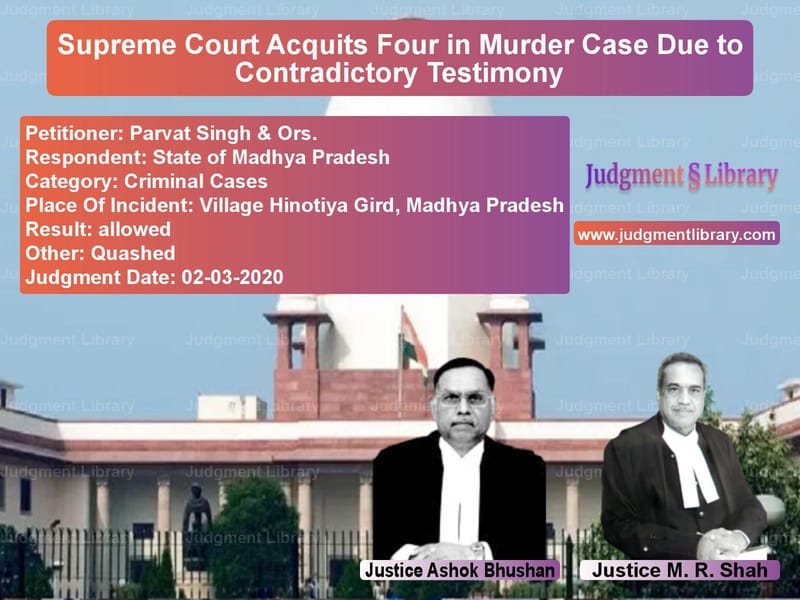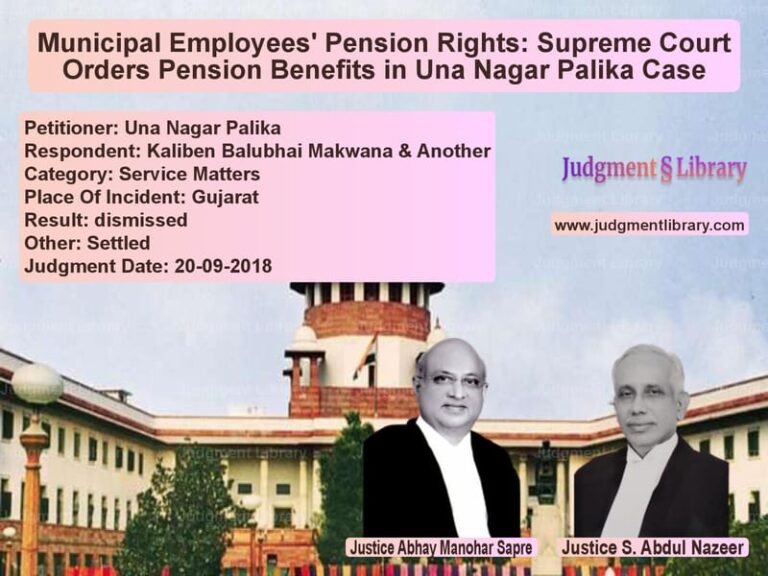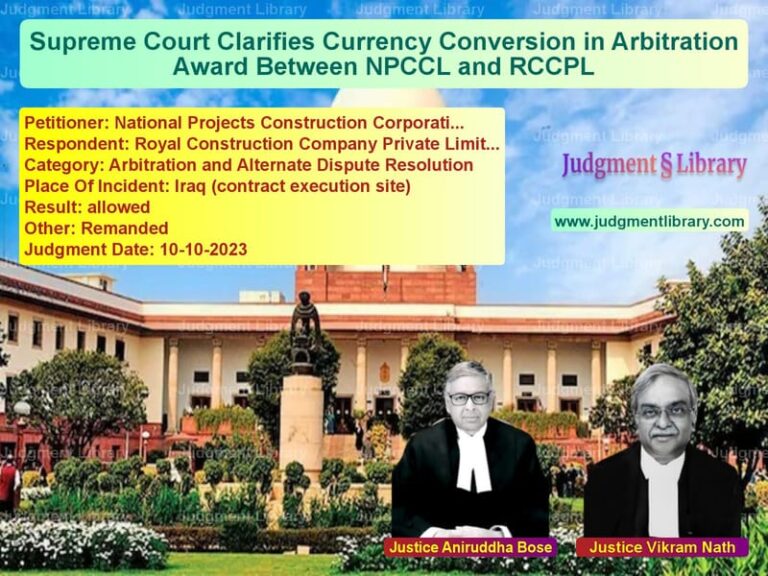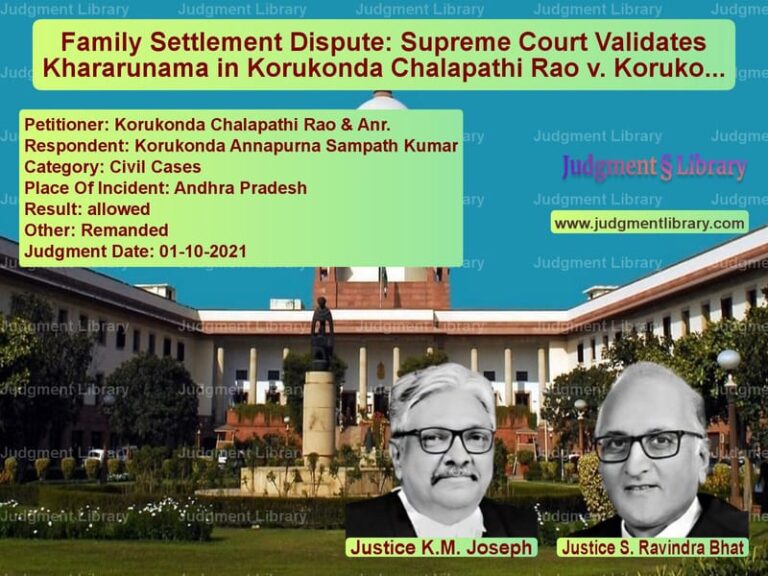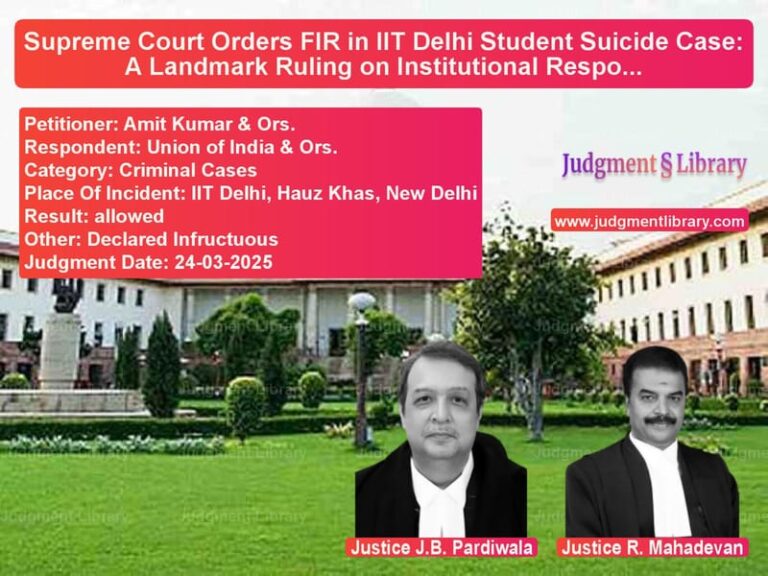Supreme Court Acquits Four in Murder Case Due to Contradictory Testimony
The case of Parvat Singh & Ors. v. State of Madhya Pradesh revolves around a murder conviction under Section 302 read with Section 149 of the Indian Penal Code (IPC). The Supreme Court was tasked with evaluating whether the conviction of the appellants was justified based on the sole eyewitness testimony of the deceased’s mother, particularly when her statements had inconsistencies.
The trial court had convicted all the accused, and the High Court upheld this ruling. However, the Supreme Court carefully scrutinized the testimony, especially considering that it was a dark night at the time of the incident and no other independent witness corroborated the allegations. The Court ultimately set aside the conviction and granted the benefit of doubt to the appellants.
Background of the Case
The prosecution alleged that on December 1, 2005, at approximately 4-5 AM in Village Hinotiya Gird, the accused persons attacked and killed Bal Kishan. The FIR was lodged by the deceased’s mother, Mullo Bai (PW8), who claimed to have witnessed the incident from the cattle shed.
As per the FIR and prosecution’s case, the main accused, Bal Kishan (s/o Diman Singh), attacked the deceased with an axe, while the other accused (appellants) stood with sticks and participated in the attack. The trial court convicted all accused under Section 302 read with Section 149 IPC. The High Court dismissed the appeal filed by the convicted persons, affirming the trial court’s judgment.
Key Legal Issues
- Whether the sole testimony of PW8 (Mullo Bai) was reliable for convicting the accused under Section 302/149 IPC.
- Whether the inconsistencies and contradictions in the witness’s statements affected the credibility of the prosecution’s case.
- Whether the presence of the accused at the crime scene was conclusively established.
- Whether the appellants shared a common object under Section 149 IPC to commit the murder.
Arguments by the Appellants (Accused 2-5)
The appellants contended that:
- PW8’s testimony was unreliable due to significant contradictions, omissions, and improvements between her Section 161 CrPC statement and her court deposition.
- The incident occurred in complete darkness, and PW8 could not have identified the accused clearly.
- There was no independent corroboration of PW8’s claims, and no torch was recovered from the scene, which cast doubt on her ability to identify the accused.
- The High Court erred in relying on PW8’s Section 161 CrPC statement, which is inadmissible as primary evidence.
- The presence of the accused at the crime scene was not conclusively established.
Arguments by the Respondents (State of Madhya Pradesh)
The prosecution argued:
- PW8 was the sole eyewitness, and there is no legal bar on convicting an accused based on the testimony of a single reliable witness.
- PW8 had a natural presence at the crime scene since the murder occurred in her cattle shed.
- The accused were identified not only by their physical presence but also by their voices.
- The absence of a torch recovery does not negate the fact that PW8 saw the accused.
Supreme Court’s Observations
The Supreme Court noted several discrepancies in PW8’s testimony:
“The evidence of a sole witness can form the basis for conviction, provided it is wholly reliable. However, where the witness’s statement contains contradictions and material omissions, it would not be safe to base a conviction solely on such testimony.”
The Court further observed:
- PW8’s statement under Section 161 CrPC differed significantly from her court deposition, particularly regarding whether the accused were holding lathis.
- While PW8 initially stated that the accused ran away after the attack, she later mentioned that two of them held the deceased while another delivered the fatal axe blow.
- The prosecution failed to produce independent witnesses to corroborate the claim.
- Since it was a dark night (Amavasya), the witness’s claim of identifying the accused in the dim torchlight was doubtful.
Final Judgment
The Supreme Court set aside the conviction, holding:
- The appellants were entitled to the benefit of doubt due to material inconsistencies in PW8’s testimony.
- The conviction solely based on the testimony of an unreliable witness cannot be sustained.
- The trial court and High Court erred in ignoring the discrepancies and in convicting the accused without sufficient corroborative evidence.
Conclusion
This ruling underscores the importance of a reliable witness in securing a conviction. Key takeaways from the judgment include:
- Courts should be cautious in convicting accused persons solely based on the testimony of a single witness.
- Discrepancies and contradictions in a witness’s statement can be grounds for granting the benefit of doubt to the accused.
- Identifying an accused in poor lighting conditions requires strong corroborative evidence.
The Supreme Court’s decision upholds the fundamental principle that conviction must be based on evidence that is beyond reasonable doubt.
Petitioner Name: Parvat Singh & Ors..Respondent Name: State of Madhya Pradesh.Judgment By: Justice Ashok Bhushan, Justice M. R. Shah.Place Of Incident: Village Hinotiya Gird, Madhya Pradesh.Judgment Date: 02-03-2020.
Don’t miss out on the full details! Download the complete judgment in PDF format below and gain valuable insights instantly!
Download Judgment: Parvat Singh & Ors. vs State of Madhya Prad Supreme Court of India Judgment Dated 02-03-2020.pdf
Direct Downlaod Judgment: Direct downlaod this Judgment
See all petitions in Murder Cases
See all petitions in Bail and Anticipatory Bail
See all petitions in SC/ST Act Case
See all petitions in Judgment by Ashok Bhushan
See all petitions in Judgment by Mukeshkumar Rasikbhai Shah
See all petitions in allowed
See all petitions in Quashed
See all petitions in supreme court of India judgments March 2020
See all petitions in 2020 judgments
See all posts in Criminal Cases Category
See all allowed petitions in Criminal Cases Category
See all Dismissed petitions in Criminal Cases Category
See all partially allowed petitions in Criminal Cases Category

